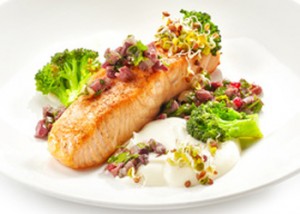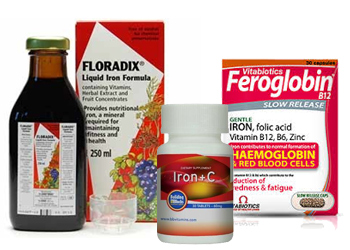The Special Nutritional Needs of Women Triathletes
by Jo Scott-Dalgleish, Nutritional Therapist
 As women who compete in triathlon, regardless of whether it’s your first sprint event or you are a seasoned long course triathlete, you can’t afford not to pay attention to your nutrition. Some people even refer to nutrition as the 4th discipline of triathlon – or is it the 5th, after transition?
As women who compete in triathlon, regardless of whether it’s your first sprint event or you are a seasoned long course triathlete, you can’t afford not to pay attention to your nutrition. Some people even refer to nutrition as the 4th discipline of triathlon – or is it the 5th, after transition?
What you eat, and when you eat it, has a direct effect on how well you perform and recover, so following nutritional tips given to triathletes is important.
But the nutritional issues faced by women triathletes do differ from those of men in certain respects. Not only do women have varying needs for certain nutrients, like iron, and – generally – smaller body sizes, but they commonly have different attitudes towards food than most men, which may lead to problematic eating habits by some female triathletes. For example, many women triathletes tend to be concerned about their weight and as a result sometimes eat less than they really need to. This can compromise performance.
As a triathlete, you are making higher demands on your body than the average woman, and this requires more fuel, in the form of carbohydrates and fats, more “building blocks” from protein to enable repair and recovery, and a greater amount of micronutrients, eg vitamins, minerals and phytonutrients, to help facilitate your body’s various metabolic processes and maintain good health.
So it’s important to eat enough calories in the first place to provide all the necessary nutrients. If the average woman requires 2000 calories a day to maintain her weight, a triathlete training for 1-2 hours per day is looking at around 2300 to 2600 calories. I don’t suggest that you actually count calories, but listen to your body and if you are hungry, eat!
However, it is really important to choose good quality foods. The foundation of your diet should be vegetables, fruits, lean meats and fish (unless vegetarian), wholegrains, eggs and dairy foods (unless vegan), nuts, seeds, beans, lentils, and healthy oils like olive, flaxseed and coconut.
Around 80-90% of the foods you eat should come from these groups, with no more than 10%-20% from refined carbohydrates, processed foods and added sugars. If you eat in this way, and in line with your appetite, you will find you are able to give your body the nutrients and energy it needs without gaining weight.
If you feel that you do need to lose some weight, it is best to do this in the off-season, not while you are training for an event, and you should aim at losing weight slowly rather than going on a crash diet. A good strategy for off-season weight loss is reduce the amount of starchy and sugary carbohydrates that you eat while slightly increasing your protein intake and maintaining the amounts of healthy fats in your diet.
 Aside from eating sufficient calories, other areas that female triathletes need to pay particular attention to are getting enough iron in your diet, consuming enough healthy fats and supporting your bone health.
Aside from eating sufficient calories, other areas that female triathletes need to pay particular attention to are getting enough iron in your diet, consuming enough healthy fats and supporting your bone health.
Women need more iron in their diet than men: 14.8mg daily compared with 8.7mg. This is due to iron losses in menstrual blood. Anaemia, a low level of iron in the blood, is not uncommon in female athletes. It is characterised by symptoms such as fatigue, headaches, light-headedness and unusual breathlessness during exercise. This can adversely affect performance and you should see a GP for a blood test if you start to experience these symptoms. If anaemia is diagnosed, iron supplements are likely to be prescribed by a doctor.
Iron-deficiency anaemia is more common among vegetarians, as less of the iron found in plants is absorbed into the bloodstream than that found in meat. However, it can also affect those who do eat red meat. Choose the best quality meat you can afford and have it once or twice a week, as well as some plant sources of iron.
If you are vegetarian, include 6-8 eggs in your diet each week as well 2-3 servings daily of vegetables that contain iron like lentils, beans, pumpkin seeds, tofu and dried apricots. These should be eaten with a source of vitamin C, eg fruit or vegetables, to improve absorption. If you are vegan, add a tablespoon of blackstrap molasses to your diet each day as well as eating plenty of the other plant sources.
Don’t be afraid of eating fats from natural sources. Your body needs fat to function: around 60% of your brain is composed of fat, for example. Fats are required for hormone, nervous system and immune function, and are also used for energy at low intensities.
As a triathlete, don’t fall into the trap of following a low fat diet, which could adversely affect your ability to train, your race performance, your susceptibility to illness and even your moods. Around 30% of the calories in your diet should come from a mixture of saturated, monounsaturated and polyunsaturated fats.
To make sure that you are having enough healthy fats, have 4-5 of the following choices as part of your diet each day, choosing as wide a range of different foods as possible across the week:
- half an avocado
- 100g of oily fish like salmon, tuna, sardines, trout or mackerel; two eggs
- 30g of mixed plain nuts
- a teaspoon of sunflower, pumpkin seeds or sesame seeds
- a teaspoon of chia seeds or ground flax seed
- a tablespoon of extra virgin olive oil or hempseed oil in a salad dressing
- a tablespoon of coconut oil or 5g butter for cooking
- a tablespoon of almond or cashew nut butter
- 3-5 tablespoons of natural full fat or low fat yoghurt (not zero fat, which is likely to be high in sugar)
- 60-80g of cheese
Avoid eating refined carbohydrate foods that also contain saturated or trans-fats too often, such as cakes, biscuits and pastries, and have fatty or processed meats only occasionally. Sadly, a bacon sandwich does not count as a serving of healthy fat!
The physical action of endurance sport, particularly running, combined with the stress of training, puts your bones under a great deal of pressure and increases the need for bone-building nutrients like calcium, magnesium, boron and vitamins D and K. If training is combined with a low calorie intake and low body fat levels, and menstrual dysfunction is also experienced, bone health can be compromised.
This is known as the Female Athlete Triad. A lack of minerals and low levels of the sex hormones oestrogen and progesterone results in a lowering of bone density. This leads in turn to an increased risk of stress fractures and a slowing of recovery time from injury.
To help protect your bones, eat dairy products, or fortified alternatives like rice or coconut milk, for calcium but balance this out with plenty of sources of magnesium such as green leafy vegetables (also good for calcium and vitamin K), nuts and seeds, beans and lentils, and wholegrain. If you have a history of fractures, get your calcium and vitamin D levels tested.
I hope these tips will help you to avoid making common mistakes with your nutrition, and help you train harder and become faster. Good luck with your races!